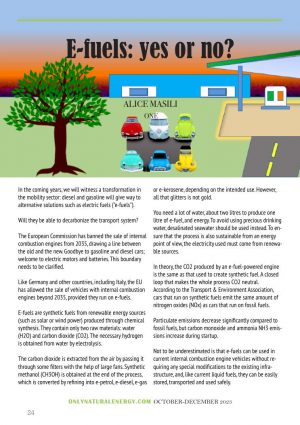 In the coming years, we will witness a transformation in the mobility sector: diesel and gasoline will give way to alternative solutions such as electric fuels (“e-fuels”). Will they be able to decarbonize the transport system?
In the coming years, we will witness a transformation in the mobility sector: diesel and gasoline will give way to alternative solutions such as electric fuels (“e-fuels”). Will they be able to decarbonize the transport system?
The European Commission has banned the sale of internal combustion engines from 2035, drawing a line between the old and the new. Goodbye to gasoline and diesel cars; welcome to electric motors and batteries. This boundary needs to be clarified.
Like Germany and other countries, including Italy, the EU has allowed the sale of vehicles with internal combustion engines beyond 2035, provided they run on e-fuels.
E-fuels are synthetic fuels from renewable energy sources (such as solar or wind power) produced through chemical synthesis. They contain only two raw materials: water (H2O) and carbon dioxide (CO2). The necessary hydrogen is obtained from water by electrolysis.
The carbon dioxide is extracted from the air by passing it through some filters with the help of large fans. Synthetic methanol (CH3OH) is obtained at the end of the process, which is converted by refining into e-petrol, e-diesel, e-gas or e-kerosene, depending on the intended use. However, all that glitters is not gold.
You need a lot of water, about two litres to produce one litre of e-fuel, and energy. To avoid using precious drinking water, desalinated seawater should be used instead. To ensure that the process is also sustainable from an energy point of view, the electricity used must come from renewable sources.
In theory, the CO2 produced by an e-fuel-powered engine is the same as that used to create synthetic fuel. A closed loop that makes the whole process CO2 neutral.
According to the Transport & Environment Association, cars that run on synthetic fuels emit the same amount of nitrogen oxides (NOx) as cars that run on fossil fuels. Particulate emissions decrease significantly compared to fossil fuels, but carbon monoxide and ammonia NH3 emissions increase during startup.
Not to be underestimated is that e-fuels can be used in current internal combustion engine vehicles without requiring any special modifications to the existing infrastructure, and, like current liquid fuels, they can be easily stored, transported and used safely.
They can completely replace gasoline and diesel with no problems for the engine. No other technology currently allows CO2 emissions to be neutralized, even from existing cars with internal combustion engines. However, some problems need to be resolved. For example, there is the production factor. According to a study published in the Nature Climate Change Journal, the energy consumption for the same distance with an e-fuel vehicle is five times higher than with an electric car.
So far, this fuel type has not been produced on a large scale. The first plant was opened in 2021 in Punta Arenas, Chile, by Porsche (which will initially use it in motorsports), together with Siemens and ExxonMobil, with a target of 550 million litres per year. More factories are planned for 2024 in Norway.
Yet, sourcing e-fuels is expensive. But price estimates need to be revised. According to the Potsdam Institute for Climate Impact Research in non-commercial settings, the price would be around 50 euros per litre. However, the price will decrease with production in larger quantities due to economies of scale. The German eFuel Alliance estimates that the production cost of a litre of synthetic fuel will be between 1.61 and 1.99 euros in 2025 (and then between 0.70 and 1.33 in 2050), while a study by the Icct (International Council on Clean Transportation) assumes 2.8 euros per litre.
Controversial opinions are also in the auto industry. Major automakers are focusing on electric car production. In contrast, some luxury car makers, notably Porsche and Ferrari, strongly support e-fuels. The superior performance of these liquid fuels compared to electric vehicle batteries would ensure that they can continue to produce sports cars with roaring engines, regardless of the cost of e-fuels.
Likely, e-fuels will only represent a small niche in the automotive sector. Still, they could play a role in decarbonizing sectors without a viable electric alternative, such as aviation with synthetic jet fuel and maritime transport.
On this front, especially for aviation, the Norwegian company Norsk is working very hard.
If, on the one hand, it is true that research is being done along these lines – especially for the development of electric and/or hydrogen fuel cell trucks (think of Tesla and Tevva) – on the other hand, it is undeniably a difficult, long and complex road.
In these sectors, which are as crucial to our economy and well-being as our cars (if not more so), e-fuels not only have a reason to be but are an absolute necessity, at least in the medium to long term.





